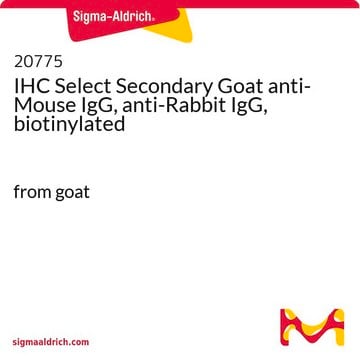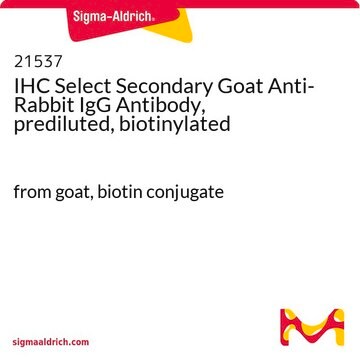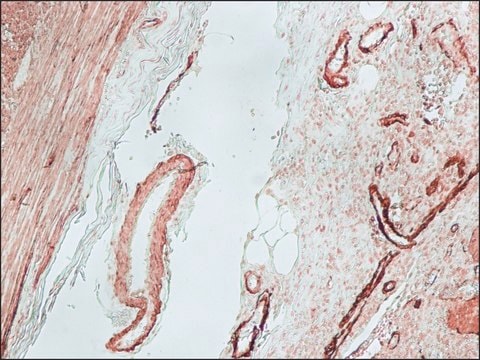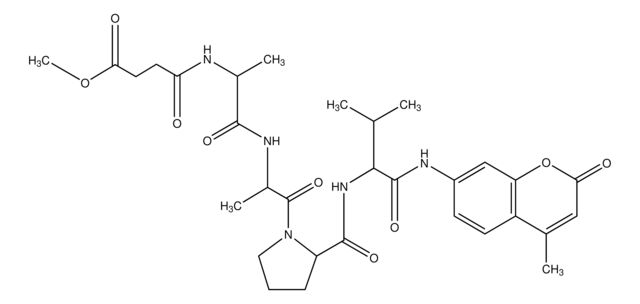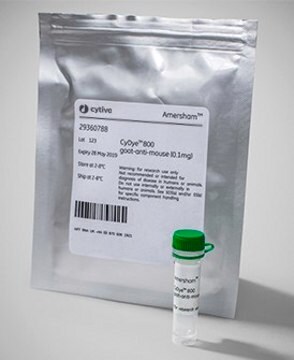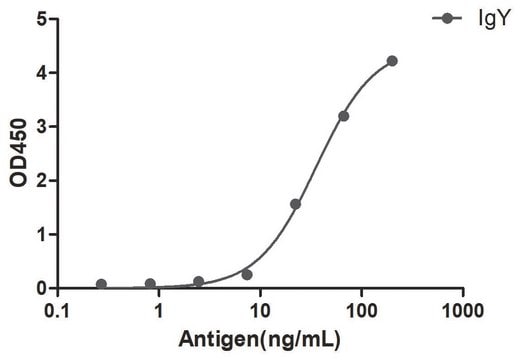21538-M
IHC Select Secondary Goat Anti-Mouse IgG Antibody, prediluted, biotinylated
from goat, biotin conjugate
Sign Into View Organizational & Contract Pricing
All Photos(1)
About This Item
UNSPSC Code:
12352203
eCl@ss:
32160702
NACRES:
NA.41
Recommended Products
biological source
goat
Quality Level
conjugate
biotin conjugate
antibody product type
secondary antibodies
clone
polyclonal
species reactivity
mouse
manufacturer/tradename
Chemicon®
IHC Select
technique(s)
immunohistochemistry: suitable (paraffin)
target post-translational modification
unmodified
Application
Prediluted for use in Immunohistochemical staining procedures. For example:
Blocking Reagent
Primary Antibody (Mouse IgG) or Negative Control Reagent
Biotinylated Secondary Antibody (Gt X Ms IgG)
Streptavidin-Enzyme Conjugate
Chromogen
Counterstain
For best results use this reagent in conjunction with other IHC Select detection reagents. A complete list of reagents is available at www.chemicon.com.
Blocking Reagent
Primary Antibody (Mouse IgG) or Negative Control Reagent
Biotinylated Secondary Antibody (Gt X Ms IgG)
Streptavidin-Enzyme Conjugate
Chromogen
Counterstain
For best results use this reagent in conjunction with other IHC Select detection reagents. A complete list of reagents is available at www.chemicon.com.
Research Category
Secondary & Control Antibodies
Secondary & Control Antibodies
Research Sub Category
Whole Immunoglobulin Secondary Antibodies
Whole Immunoglobulin Secondary Antibodies
This Goat IgG antibody is validated for use in IHC for the detection of the Mouse IgG protein.
Physical form
Goat Anti-Mouse IgG in PBS containing carrier protein, with 0.1% Kathon as preservative.
Storage and Stability
When stored at 2-8°C, this reagent is stable up to the expiration date printed on the label. Do not freeze or expose to elevated temperatures.
Legal Information
CHEMICON is a registered trademark of Merck KGaA, Darmstadt, Germany
Disclaimer
Unless otherwise stated in our catalog or other company documentation accompanying the product(s), our products are intended for research use only and are not to be used for any other purpose, which includes but is not limited to, unauthorized commercial uses, in vitro diagnostic uses, ex vivo or in vivo therapeutic uses or any type of consumption or application to humans or animals.
Not finding the right product?
Try our Product Selector Tool.
Signal Word
Warning
Hazard Statements
Precautionary Statements
Hazard Classifications
Aquatic Chronic 3 - Skin Sens. 1
Storage Class Code
12 - Non Combustible Liquids
WGK
WGK 2
Flash Point(F)
Not applicable
Flash Point(C)
Not applicable
Certificates of Analysis (COA)
Search for Certificates of Analysis (COA) by entering the products Lot/Batch Number. Lot and Batch Numbers can be found on a product’s label following the words ‘Lot’ or ‘Batch’.
Already Own This Product?
Find documentation for the products that you have recently purchased in the Document Library.
Eman A Ali et al.
Scientific reports, 13(1), 9794-9794 (2023-06-17)
Busulfan (BUS) is an anticancer agent with serious adverse effects on various body organs, including the lung and testis. Sitagliptin was proven to have antioxidant, anti-inflammatory, antifibrotic, and antiapoptotic effects. This study aims to evaluate whether sitagliptin, a DPP4I, ameliorates
Yasser Basmaeil et al.
Frontiers in cell and developmental biology, 9, 650125-650125 (2021-07-09)
Mesenchymal stem/stromal cells isolated from chorionic villi of human term placentae (CV-MSCs) possess unique biological characters. They exhibit self-renewal, directional migration, differentiation, and immunomodulatory effects on other cell lineages, by virtue of which they can be utilized as therapeutic carriers
Yasser Basmaeil et al.
Cells, 10(12) (2021-12-25)
Mesenchymal stem cells (MSCs) have been shown to suppress tumor growth, inhibit angiogenesis, regulate cellular signaling, and induce apoptosis in cancer cells. We have earlier reported that placenta-derived decidua parietalis mesenchymal stem/stromal cells (DPMSCs) not only retained their functional characteristics
Zhongchan Sun et al.
Reviews in cardiovascular medicine, 23(12), 408-408 (2022-12-14)
Peripheral arterial disease (PAD) can severely compromise limb vitality and function. Angiogenesis plays an important role in healing of ischemic lesions. Radiolabeled RGD (Arg-Gly-Asp) peptides specifically targeting α v β 3 integrin are promising tracers for imaging angiogenesis. In this
Our team of scientists has experience in all areas of research including Life Science, Material Science, Chemical Synthesis, Chromatography, Analytical and many others.
Contact Technical Service